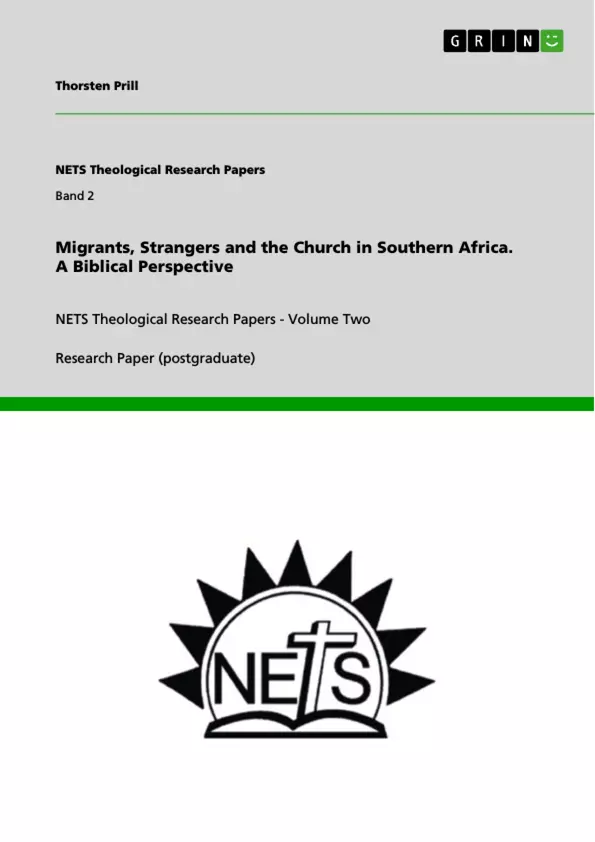In 2008 many people in Africa and elsewhere were shocked when they saw on their televisions how Zimbabwean, Mozambican and Malawian immigrants were attacked, robbed and beaten up in South African townships. This eruption of xenophobic violence against millions of fellow Southern Africans was unheard of. Some authors have claimed that stereotyping and vilifying language in the Bible contributed to these xenophobic attacks. In this research paper Thorsten Prill shows that the biblical teaching actually rejects racism and promotes acceptance beyond ethnic and social boundaries. The purpose of this paper is to give an overview of what the Bible has to say about migrants and strangers and to encourage Christians to live accordingly and to promote the biblical view in their local communities and beyond. Dr Thorsten Prill lectures in missiology, systematic theology and practical theology at Namibia Evangelical Theological Seminary (NETS), Windhoek. He is the author of two books, German Protestantism and the Spirit of God (2010) and Global Mission on our Doorstep (2008). He has also edited several other books, including Mission Namibia (2012) and God’s Mission in Southern Africa (2011). He serves as an Associate Pastor at Inner-City Lutheran Congregation, Windhoek.
Inhaltsverzeichnis (Table of Contents)
- Glossary
- Ethnocentrism and xenophobia in southern Africa
- Migrants and strangers in the Bible
- The treatment of foreigners in the Bible
- Conclusion
- Bibliography
- Biographical notes
Zielsetzung und Themenschwerpunkte (Objectives and Key Themes)
This text explores the complex issue of migrants, strangers, and the role of the church in Southern Africa, using a biblical perspective. It aims to analyze the challenges posed by ethnocentrism and xenophobia in the region, examining both the historical and contemporary context.
- The impact of ethnocentrism and xenophobia on migrants and refugees in Southern Africa
- The treatment of foreigners in the Bible and its relevance to contemporary challenges
- The role of the church in promoting reconciliation, justice, and inclusion in a diverse society
- The influence of historical factors, such as colonialism and missionary work, on current social dynamics
- The challenges and opportunities for the church to address issues of immigration and integration.
Zusammenfassung der Kapitel (Chapter Summaries)
Ethnocentrism and xenophobia in southern Africa: This chapter begins by highlighting the 2008 xenophobic attacks in South Africa against migrants from Zimbabwe, Mozambique, and Malawi, illustrating the extent of ethnocentric violence in the region. It explores the historical and contemporary factors contributing to these tensions, including racism, tribalism, and political instability.
Migrants and strangers in the Bible: This chapter delves into the biblical perspective on migrants and strangers, emphasizing the importance of hospitality and welcoming the foreigner. It examines various biblical texts that address the treatment of foreigners, highlighting the ethical principles and responsibilities outlined in scripture.
The treatment of foreigners in the Bible: This chapter continues the analysis of biblical texts, exploring how different authors in the Bible address the treatment of foreigners. It examines various perspectives on issues such as citizenship, land ownership, and the obligations of both foreigners and host communities.
Schlüsselwörter (Keywords)
The central keywords of this text include: ethnocentrism, xenophobia, migrants, refugees, strangers, church, Southern Africa, Bible, reconciliation, justice, inclusion, diversity, colonialism, missionary work, immigration, integration, hospitality, and tribalism.
Frequently Asked Questions
What is the biblical perspective on migrants and strangers?
The Bible promotes acceptance beyond ethnic boundaries, emphasizing the importance of hospitality and the ethical responsibility to welcome and protect foreigners.
How does the church address xenophobia in Southern Africa?
The church is encouraged to promote reconciliation, justice, and inclusion, actively rejecting racism and tribalism in accordance with biblical teachings.
What were the causes of the 2008 xenophobic attacks in South Africa?
The attacks were fueled by ethnocentrism, political instability, and historical factors like colonialism, leading to violence against millions of fellow Southern Africans.
Does the Bible support or reject racism?
Biblical teaching rejects racism and promotes the equality of all people, regardless of their social or ethnic background.
What is the role of missiology in the context of migration?
Missiology explores how the church can fulfill its mission by addressing contemporary social challenges like immigration, integration, and the needs of refugees.
- Citar trabajo
- Dr. Thorsten Prill (Autor), 2013, Migrants, Strangers and the Church in Southern Africa. A Biblical Perspective, Múnich, GRIN Verlag, https://www.grin.com/document/214854



